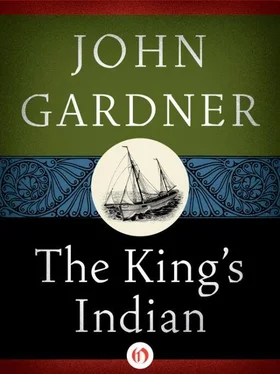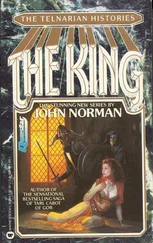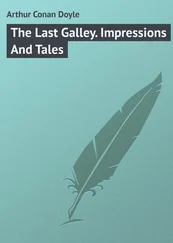10
I have no idea what’s going on. I stumble down the track with the doctor and the official, torches and lanterns all around us. Ahead of us, hippies in flapping rags, shouting, howling at one another. Behind us someone is ordering the passengers back onto the train. The stopped train — I glance at it over my shoulder — is grotesque in the enormous darkness. The red of the lantern on the rear platform is like light seen through blood. Beyond the cinders at the edge of the tracks there’s a deep, dry gully on either side, and, beyond the gullies, old trees, barkless, strangled by woodbine now also dry and dead. We reach the silent group of people, faces out of some war photograph.
“Let us through, please,” the official says. “This man’s a doctor.”
The crowd murmurs, opens up a path for us. I press in behind the official and the doctor. We come to a gigantic young man on his knees, bent over, writhing. He’s crying and moaning something, I can’t make out what. “This man’s a doctor,” the official says again.
The young man twists his head up, bearded, wild. His eyes are as tiny and crooked as a goat’s. He shouts at us, enraged. “We don’t need a doctor, we need a priest!”
“I’m a minister,” I say, but no one hears me.
“Let us through,” the doctor says.
The young man straightens up, shouting at us, crazy, and we see what he’s been bending over. I look away, getting only a fleeting impression — an enormous pregnant abdomen in labor, a face smashed featureless, dripping hair, the dead stock of a tree.
“Christ,” the doctor whispers.
“Is she alive?” someone asks.
“Get these damn people out of here,” the doctor hisses.
The official straightens up, wipes his forehead, begins shouting. Everyone ignores him, staring at the body in the unearthly light of torches, red lanterns.
“She was stoned,” someone explains to me, clinging to my shirt, driving the words in like hammer blows in hopes of being rid of all guilt. “She was stoned. Couldn’t see where she was going.”
“Get them out of here,” the doctor shouts. His crease-chopped face is satanic with rage; his dry voice crackles with violence.
I back away; one more quick look at the body. Smashed, one leg turned backwards like a ridiculous doll’s. Trainmen are pulling and pushing at the crowd. The great tall wildman with the beard and the crooked, goatish eyes is shaking his fists and shouting at us, or shouting at the sky; no one can tell. “Lunatics! Where were you? God damn you to hell!” He locks his giant hands together and wrings them, elbows going right and left, his torso cocked forward, his knees clamped together like the toes of his oversized shoes. “Damn them!” he wails. “God damn them! God damn you!” He flings his arms outward, rocks back on his heels. His rags fly crazily around him. Though the trainmen are hurrying the others along, no one goes anywhere near the enormous goat.
A thin-bearded boy takes my elbow, explains to me soberly, as if I might help him with his problem, “She was his chick. Back there.” He searches my face.
The wildman keens, rocking backward and forward. “She’s free of you at last, God damn you all. She’s free, you hear me?” He laughs, shrill with pain. “She’s free! She’s free!” There’s no doubt of it now: it’s the stars he shakes his fists at — the indifferent shrapnel hurtling away from the darkness, black hole at the center.
I move a step toward him. I can’t help myself, though I know pretty well what I’ll seem to him. “Listen!” I call out. “Get hold of yourself!”
He stops, glares at me, his horrible goat-nosed face reddish-gray in the lantern-light.
“Let me talk with you,” I say. “I’m a minister.”
His head drops, his wicked eyes roll up, and for an instant I believe he really will charge me, in the blindness of his pain and rage. But there is nothing to charge. I am no one, for the moment; a disembodied voice; God’s minister.
The wildman stumbles, drops to one knee, groaning, gushing tears. Cautiously, I touch his shoulder. “Trust me,” I say. (The fall is endless. All systems fail.) I force myself to continue. I have no choice.
1
Life, I’ve often been inclined to believe, is preposterous. Witness, for instance, the fact that I of all people should be elected to tell this tale. I have, like other men, my virtues and defects — rather more virtues than defects, I believe (and I would say the same of any other more or less law-abiding man) — but I am not, have never been, the kind of being who causes great stirrings and swarmings whenever he sits or nibbles a pastry or puts his cap on. I’m as plain a man as was ever set to toiling and grieving on this godforsaken planet: a bachelor; a reader of dull books; a country doctor.
But perhaps the powers are wiser than they seem, choosing a common, unpoetic soul for a tale at first glance more fit for the author of “The Raven” or that even more curious masterpiece of feeling and thought caught in one great gasp, the “Ulalume.” I am not, like Mr. Poe, a Platonist. (So he seems, at least, in the writings I’ve encountered.) I am, as I say, a country doctor, and what I chiefly know about absolute values is that they do not necessarily aid the digestion, but frequently impair it. Neither can I whole-heartedly share the Platonistic predilection for Eternity as opposed to Present Time. In my youth I used to ponder, in mixed discomfiture and annoyance, the remark of the famous chemist Davy, that when he had heard, with disgust, in the dissecting rooms, the opinion of the physiologists on the gradual accretion of matter, and its becoming endowed with irritability, ripening into sensibility, and acquiring such organs as were necessary by its own inherent forces, and at last issuing into intellectual existence — when he heard this atheist opinion, he remarked, a walk into green fields or woods, beside the banks of rivers, would bring back his spirit and feelings from Nature to God. I concluded, in the end, that Humphrey Davy was a perfect fool, though by no means mistaken. His pompous bray refuted nothing, but the walk was a piece of pure sanity. The mulch of the flowering spirit is under thy feet, neighbor!
All this may seem wearisome and irrelevant to you. Most people, I’ve noticed, are forever impatient, always hustling and bustling and darting their eyes around, now glancing nervously back past their shoulders, now craning forward in hopes of discerning in the mists of Time the outlines of things yet to be. I take no part in all that. I stand pretty firmly where I happen to be put, and I ponder things. I do not necessarily learn anything. But pondering is good for the constitution: it lends a wise calm to all bodily parts and lends to the mind and soul a special dignity, like that of an old Red Indian sitting in a tree. I like things done properly — even tortuously, when that’s what’s required — but done by a man who’s got one ear cocked toward the infinite. It’s for that reason I begin this tale with a few rather ponderous but needful remarks about myself.
It is difficult, however …
Hmm. Yes.
Perhaps I will drop that approach and attempt some other.
2
We always have tornadoes in the spring, down in southern Illinois. I’ve grown used to them, and thoroughly fatalistic. I feel, perhaps, a certain hesitancy about going out on calls on one of those mornings whose calm forbodes a twister. But sickness does not start up and stop as bird-songs do, depending on the weather, and so, despite the uneasy feeling, I hitch up Shakespeare, throw in my medical bag, and away we go. The weather darkens, as the day progresses; my uneasiness increases, and so does Shakespeare’s. He glances at me as I come out from a call and loose the reins from the hitchingpost, and I throw a glance back at him, startled by some fear far, far below conscious thought. It’s as if, for an instant, we don’t recognize each other, after all these years together. In a flash, that’s past, the ear that seemed for one stroke of a heartbeat, to be flattening back like a warhorse’s ear is erect once more, and the eyeball that seemed to have madness in it is merely my old friend Shakespeare’s eye, long-suffering and possibly amused. I glance at the sky. So does he. “Getting darker,” I say, and the old horse considers it, turning it over in his mind till he forgets what made him think of it. I chat on, riding down country roads, saying pretty much what I say to my patients to keep their minds off aches and pains. And the sky darkens further— blue clouds, almost black, coming over from south-southwest. The light burns green, slanting from the east, and the forested hills are suddenly beautiful: great, white sycamores bursting through the blue-black and emerald green forest like heart attacks, and above us the thunderheads loaded and flickering with lightning like a dying man’s brain.
Читать дальше











![John Bruce - The Lettsomian Lectures on Diseases and Disorders of the Heart and Arteries in Middle and Advanced Life [1900-1901]](/books/749387/john-bruce-the-lettsomian-lectures-on-diseases-and-disorders-of-the-heart-and-arteries-in-middle-and-advanced-life-1900-1901-thumb.webp)
